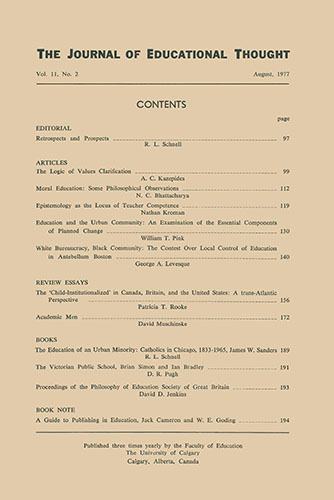Education and the Urban Community: An Examination of the Essential Components of Planned Change
DOI:
https://doi.org/10.55016/ojs/jet.v11i2.43744Abstract
This paper details the structural weaknesses of contemporary educational programming in the urban setting. It is argued th8;t the separate disciplinary approach to what are seen as multidisciplinary problems is dysfunctional and that the lack of. systematic evaluation procedures leads inevitably to the frustrat10n of desired program goals. Two programs are analyzed to illustrate this position (Head Start and Youth Service Bureaus). Special focus is given to (a) the school as in institution disposing both legitimate and illegitimate status, (b) ways in which the educational arena must be adapted to accommodate contemporary pluralistic society, (c) the interface between education and other critical arenas that make up the urban milieu and (d) a procedure for citizen participation in educational decision making.
Downloads
Published
Issue
Section
License
The Journal of Educational Thought retains first publication rights for all articles. The Journal grants reproduction rights for noncommercial educational purposes with the provision that full acknowledgement of the work’s source be noted on each copy. The Journal will redirect to the appropriate authors any inquiries for further commercial publication of individual articles. All authors wishing to publish in JET will be asked to fill in and sign a Consent to Publish and Transfer of Copyright agreement.
Authors must affirm that any submission to JET has not been and will not be published or submitted elsewhere while under considration by JET.

